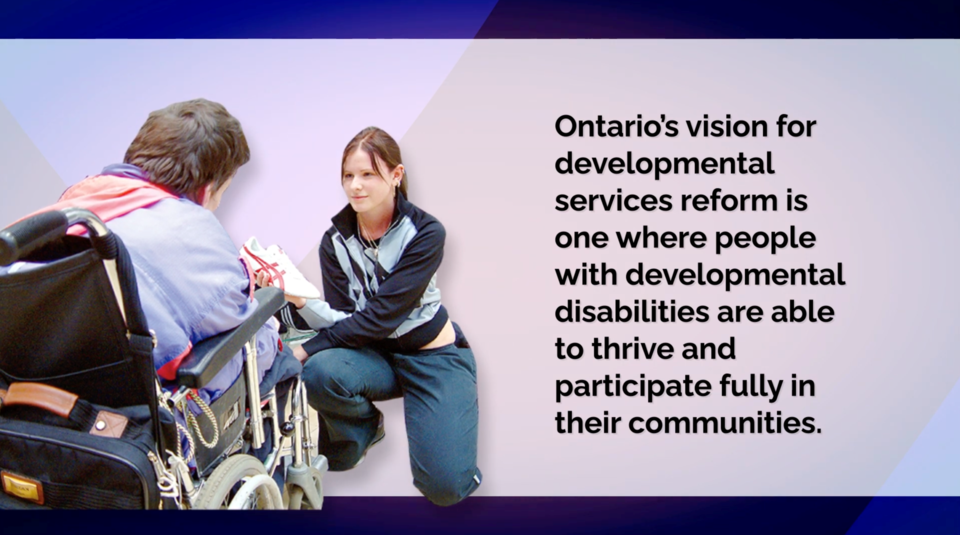The Ontario government is moving forward with a plan to change how services for adults with developmental disabilities are funded, first promised two years — and two ministers — ago.
In 2021, then-minister of Children, Community and Social Services (MCCSS) Todd Smith released a plan called Journey to Belonging: Choice and Inclusion that promised to reform developmental services over eight to 10 years. It committed to developing a new funding model and emphasized giving people more control over their funding.
In March, the new assistant deputy minister of MCCSS responsible for provincially funded adult developmental services wrote to partners in the sector to say the government is in the "design phase of reform" and has engaged consulting firm KPMG to lead a study of "the real costs of services, including where and why they vary across the province."
A spokesperson for the new minister, Michael Parsa, said the government is "working to develop a new, evidence-based funding approach that will determine funding for adult developmental services supports based on a person’s assessed needs."
"The KPMG costing study is part of this research and consultation. Agency and stakeholder voices are of critical importance to this work. The ministry and KPMG continue to work closely with sector partners throughout this process to listen, learn and reflect their feedback in the work," said Patrick Bissett.
At the end of the month, the minister in charge of the file, Merrilee Fullerton, resigned, and Parsa was appointed — the fourth Progressive Conservative in the post since the party took power in 2018.
Meanwhile, the province has given itself more time to implement changes.
An omnibus bill before the legislature aimed at reducing "red tape" would repeal unproclaimed sections of provincial legislation that pertain to the funding of developmental services that were to come into effect in July, and re-enacting them to come into force at a day chosen by cabinet and in a more gradual manner, with more control given to the government through regulation-making authority.
"The proposed amendment to the Services and Supports to Promote the Social Inclusion of Persons with Developmental Disabilities Act, 2008 (SIPDDA) will allow the Ministry of Children, Community and Social Services to conduct necessary research and consultations with sector partners before implementing a new funding approach and would also allow for a gradual approach to help minimize disruptions to service agencies, individuals and families," said a spokesperson for the Ministry of Red Tape Reduction.
Monique Taylor, the official opposition critic for children, community and social services, said the government hasn't made clear why it needs more time.
"We've heard since Smith was minister that changes to developmental services delivery was on the way," the NDP MPP said in an emailed statement. "The government needs to explain why these delays are happening now.”
While no details have been announced, the Journey to Belonging plan includes an emphasis on direct funding, where people with developmental disabilities and their support networks manage their funding directly. Ontario's current funding model is a mix, with the majority of support provided by service agencies given transfer funding, and a minority by direct funding through the Passport program, which reimburses costs related to community participation and respite for caregivers, but not housing support.
The legislation that was set to come into force in July would have allowed the expansion of direct funding for residential and community supports, according to Community Living Ontario, which supports such a move.
The organization, which advocates for people with intellectual disabilities, has set out recommendations to the government on how to implement an expansion of direct funding, arguing that it increases flexibility, control, and quality of life for those who choose it.
However, a union representing workers at service agencies has raised concerns about the move.
In a submission to the government, the Ontario Public Service Employees Union argued that families have been calling for direct funding for decades because governments have failed to provide adequate services through agencies. "Prolonged chronic underfunding and fragmentation of services triggered a decades-long crisis for individuals who need services and housing," it wrote.
However, it warns that without a regulatory framework, which is currently lacking when it comes to Passport funding, further direct funding could "destabilize the whole sector."
"This unregulated and unaccountable approach to providing care cannot be the central pillar to Developmental Services in Ontario," it wrote.
The union also called on the government to create a provincewide strategy to address the housing crisis for people with developmental disabilities.
"The latest known numbers indicate that there were 15,700 individuals on the residential waitlist in 2017. More people are waiting — and waiting longer than ever — for housing opportunities that will allow them to live more independent lives in their communities," it said.
Meanwhile, some Ontario families need more support and have for years.
In late March, Ontario Ombudsman Paul Dubé announced he has launched "a new investigation into the plight of adults with developmental disabilities who are inappropriately housed in hospitals due to a lack of supports and services in the community."
“It is particularly concerning that vulnerable individuals with complex needs are in hospital — often for long periods — despite having no medical need to be there,” Dubé said. “They are often kept in restraints, and their condition deteriorates the longer they remain in hospital settings, according to those who have complained to us.”
The new investigation is following up on a devastating report he released in 2016 called "Nowhere to Turn" on 1,200 complaints the office had received from families in crisis because of a lack of developmental services and appropriate housing, leaving their many loved ones in hospitals, long-term care homes,
homeless shelters and jails.
